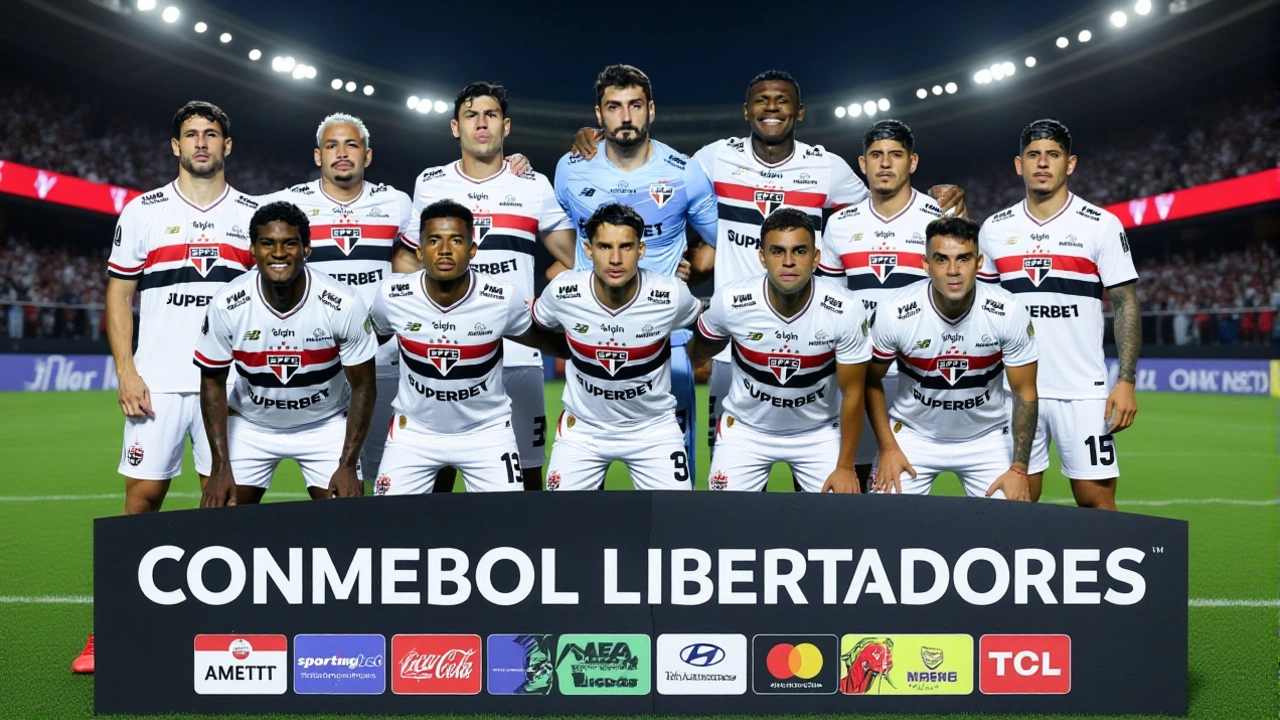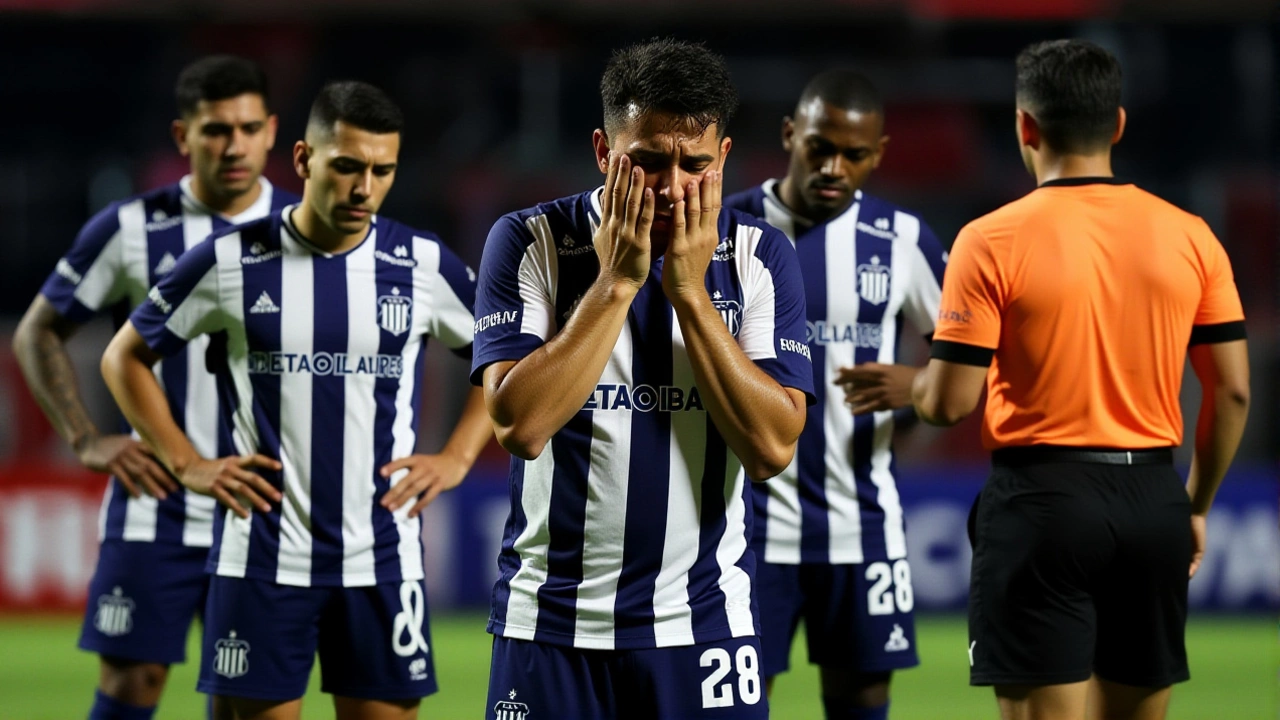When Miguel Navarro, a Venezuelan defender for Talleres took to the field at Morumbi Stadium on , he was met with an alleged xenophobic abuse from Damín Bobadilla of São Paulo FC during a Copa Libertadores Group D match. The exchange left the defender in tears and sparked a police complaint that has since reverberated across South American football.
Background to the Group D Clash
Both sides entered the match with a lot at stake. Talleres were desperate for points after an early loss to Atlético Nacional, while São Paulo FC were looking to cement a top‑two finish in the group. The fixture, held at the iconic Morumbi Stadium in São Paulo, Brazil, was the final round‑robin game of Group D and essentially a knockout for the Argentine side.
Historically, Venezuelan players have faced a steep hill of prejudice in leagues across the continent, often being unfairly labeled as "hungry" or "poor" because of the country's economic crisis. That backdrop made the stakes even more personal for Navarro, who moved to Argentina in 2022 seeking stability and a chance to showcase his talent on a bigger stage.
The Incident on the Pitch
The turning point came in the 84th minute, when Luciano (full name omitted for brevity) netted São Paulo's second goal, putting the home side ahead 2‑1. Cameras caught a heated exchange between Navarro and Bobadilla as the latter sprinted back to midfield.
According to multiple eyewitnesses and video snippets shared on social media, Bobadilla allegedly shouted a slur that translated roughly to "starving Venezuelan" or "hungry Venezuelan". Navarro’s reaction was immediate – his shoulders slumped, his eyes welled up, and he clutched his chest before collapsing onto the grass.
Referee Andrés Silva stopped play, and teammates rushed to console Navarro. He considered walking off, but after brief discussions with the interim coach Mariano Levisman and captain Augusto Schott, he stayed on the pitch to finish the match.
Reactions from Clubs and Officials
Immediately after the final whistle, Navarro approached the military police stationed at Morumbi Stadium and filed an official complaint. The police later attempted to locate Bobadilla in the São Paulo dressing room, only to discover he had already left the venue. A statement from the Brazilian side is still pending.
In a post‑match interview, a visibly shaken Navarro said, "I don't want to talk about it. I just want to go home. He knows what he said to me." His words were echoed by Levisman at the post‑game press conference, where he labeled the episode a clear case of xenophobia.
Team captain Augusto Schott added, "It hurts us because we're in a place that promotes the fight against racism. We stand with Miguel and we will not tolerate hate on the field." The club’s official statement read, "There is no place for hate in football. Football is a powerful tool of integration, respect, and unity among cultures. Miguel, we are proud of you and your roots. All of Talleres stands with you."
São Paulo FC’s management has not released a comment, but sources close to the club say an internal review is under way. Meanwhile, CONMEBOL has yet to issue a formal response, though the governing body has a history of imposing sanctions for discriminatory conduct in continental competitions.
What This Means for CONMEBOL and South American Football
The incident arrives at a time when CONMEBOL is under pressure to enforce stricter anti‑racism protocols. In 2023, the federation introduced a $10,000 fine for clubs whose players were found guilty of racist chants, but enforcement has been inconsistent.
If CONMEBOL decides to open a disciplinary case, potential penalties could range from match‑day suspensions for Bobadilla to point deductions for São Paulo FC. Such measures would send a strong message, but critics argue that fines alone are not enough to change deep‑seated attitudes.
Experts highlight that the problem extends beyond isolated incidents. Dr. María González, a sociologist at the University of Buenos Aires, notes, "Venezuelan migrants are often scapegoated in the region’s football culture, reflecting broader economic anxieties. Addressing the issue requires both punitive and educational strategies."
Looking Ahead for Talleres and the Tournament
Talleres’ elimination from the Libertadores was a bitter pill, but the club still has a chance to drop into the Copa Sudamericana, pending the final group standings. The team will need to regroup quickly, and the emotional fallout from the incident could influence their performance in the next fixtures.
Navarro, meanwhile, said on his personal Instagram account, "I will never be ashamed of my roots. I will go to the very end to denounce the xenophobic act I experienced today in Brazil." He also confirmed he will pursue the matter through both legal channels and CONMEBOL’s disciplinary process.
Fans across the continent have taken to Twitter with the hashtag #StandWithNavarro, calling for zero tolerance of discrimination. The conversation has reignited debates about how South American leagues can better protect foreign players and foster an inclusive environment.
- Match result: São Paulo FC 2‑1 Talleres
- Date & venue: 27 May 2025, Morumbi Stadium, São Paulo, Brazil
- Key allegation: Damín Bobadilla used a xenophobic slur toward Miguel Navarro
- Immediate actions: Navarro filed a police complaint; CONMEBOL investigation pending
- Potential repercussions: Player suspension, club fines, or point deductions
Key Takeaways
The episode underscores that while South American football continues to captivate millions, it also mirrors societal tensions. How governing bodies, clubs, and supporters respond will shape the sport’s cultural climate for years to come.

Frequently Asked Questions
How does this incident affect Venezuelan players in South America?
Venezuelan footballers already face stereotypes tied to their country's economic crisis. Incidents like this reinforce negative perceptions, potentially limiting transfer opportunities and increasing the emotional burden on players who already endure cultural alienation.
What disciplinary actions can CONMEBOL take?
Under its anti‑discrimination statutes, CONMEBOL may impose a match ban on the offending player, levy financial penalties on the club, or deduct points from the team's tally. In severe cases, clubs risk being expelled from the tournament.
Will the police complaint lead to criminal charges?
Brazilian law criminalizes hate speech, and police are currently reviewing the audio evidence. If prosecutors find sufficient proof, Bobadilla could face a misdemeanor charge, which may result in a fine or community service.
How might this affect São Paulo FC’s standing in the group?
The club currently sits second in Group D with six points. Should CONMEBOL impose a points deduction, São Paulo could slip to third place, jeopardizing direct qualification and forcing a play‑off for the Libertadores.
What steps are clubs taking to prevent future incidents?
Many South American clubs are rolling out anti‑racism workshops, installing multilingual signage in stadiums, and collaborating with NGOs to educate players and fans. However, consistent enforcement remains a challenge.
